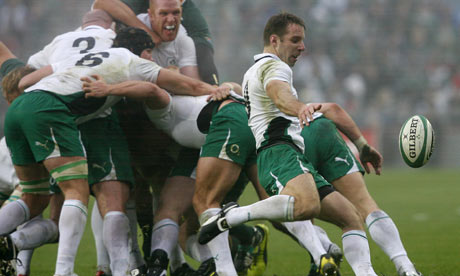
The rolling maul is back but it has lost a wheel following an International Rugby Board directive. Referees have been told to watch out for obstruction in three areas. First, when a side drives a maul from a lineout, second when one is formed in open play, particularly after a kick and finally when the ball carrier is detached at the back and continues to move forward.
The directive followed a complaint from Scotland that the defending team was too often obstructed when it tried to defend a rolling maul and, now that collapsing is no longer permitted, it was virtually impossible to legally contest for possession. Players will no longer be able to stand at the back of a maul, ball in hand, and be driven forward. The directive addresses a legitimate grievance, even if it does amount to another attack on the team in possession.
How long will it be before someone complains that when a team finds itself back-pedalling at a scrum and the ball is at the feet of the opposition No8 that it has no way within the rules of competing for possession?
Wasps show little regard for fans
Wasps' refusal to compete with Sale at a soggy Edgeley Park last month has earned them a date with a Premier Rugby panel today with the threat of a points deduction and/or a fine a potential outcome. Sale were willing to play and the referee, David Rose, declared the surface playable. Under Premiership rules, the referee's opinion is the decisive one, but IRB regulations give discretion to a team concerned about safety.
The panel has a fine line to tread, but what happened at Sale was unacceptable. According to one report, Wasps arrived after spectators had been admitted to the ground and by the time they decided they were not prepared to play, thousands had taken their seats.
It led to the farce of fans going through the turnstiles at the same time Wasps players were sitting on their coach eating pizza, an image that added to the outrage. The issue is not just whether Wasps were right, and within their rights, to unilaterally call off the match but the procedure of postponing a game.
Given that rain had been falling for days and that Edgeley Park does not have a reputation as being the quickest drying or most lushly grassed surface in the Premiership, it should have been incumbent on Wasps, or at least a decision-making representative, to have arrived at the ground earlier.
Once spectators had been admitted, the game should have started with the referee having the option to abandon it should the conditions prove dangerous. Whether Wasps brought the game into contempt is for the panel to decide, but the club treated the paying public with contempt.
A drawn out process
A draw is regarded as rare in rugby union, but there have been eight in 59 Premiership matches this season, a rate of one in every seven games or so compared to last season's rate in the regular season of one in 26 matches.
A draw is almost four times likely this season and the rate is not far off the English football Premier League's one in five. In France's top 14, the rate is one every 15 games.
Worcester have drawn three games in a row and four of the eight draws have been tryless. It is a reflection of the narrowed parameters the game is operating under and it has become increasingly possible for one team to drag another down to its level.
Saracens will go into Christmas at the top of the table with nine wins and a draw from their first 10 matches. They have only scored 13 tries and conceded five. They play the game in the right areas, do not take risks and they make opponents crack under pressure. They represent the age and they are fitting leaders, following on from South Africa in the Tri-Nations and Ireland in the Six Nations.
The challenge for other coaches, as Brian Ashton said at the weekend, is to stop being negative by going on about how hard it is to break down defences and work out a way of smoking out the likes of Saracens.

